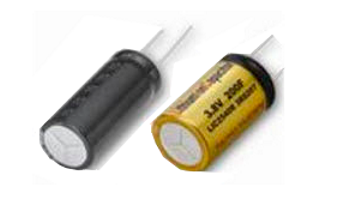lithium ion capacitor (LiC)
Lithium-ion capacitors (LiC) are hybrid capacitors characterized by enormously high capacitance values of several thousand farads (F).
As supercapacitors, LiC capacitors use two completely different electrodes: The positive electrode corresponds to that of the double layer capacitor( EDLC), while the negative electrode is doped with lithium ions. Due to the prior doping of the negative electrode with lithium ions, LIC capacitors have a higher dielectric strength compared to double-layer capacitors. Their operating voltage is between 3.8 V and 4.2 V, compared with 2.5 V to 2.7 V for double-layer capacitors.
As for capacitance density, it is up to 10 F/ cc, compared to 8 F/cc for double layer capacitors(DSK). It is comparable to that of polyacene capacitors( PAC). The power density of up to 10 kW/kg is comparable to that of double-layer capacitors, and the energy density of about 30 Wh/kg is many times higher than that of DSK capacitors.

